By Lucy Komisar
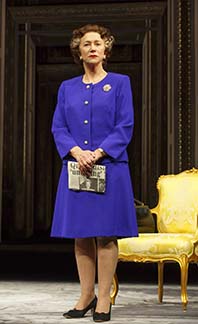
British playwright Peter Morgan is a subtle political historian, here suggesting what went on over sixty years in private meetings between ten British prime ministers and Queen Elizabeth. In Buckingham Palace. It‘s all in his imagination, but it is a careful critique of the politics and class loyalties of the characters and the Queen.
The play is fascinating, and I enjoyed it immensely. Helen Mirren is brilliant as Elizabeth through the years. Cool, contained, to the manor born, aging but ageless in her sense of self.
Morgan has written a number of notable political works, including Frost/Nixon and The Special Relationship, about the U.S. and the UK. Stephen Daldry, who directed the play Billy Elliot,” with Margaret Thatcher the villain in the miners’ strike, does an excellent job etching Morgan‘s critique of privilege. (Morgan’s father was a German Jew who escaped the Nazis, his mother a Polish Catholic who emigrated after the Soviet takeover.)
I have my favorites among the prime ministers. In truth, and as Morgan sees it, the good guy is working-class Labor PM Harold Wilson (Richard McCabe), the bad guy is Labor PM Tony Blair (Rufus Wright), and the dreadful gal is Tory PM Margaret Thatcher (a very good Judith Ivey).
It is more than ironic that Wright also plays the Tory, David Cameron. Thatcher, once asked about her greatest achievement, said it was Tony Blair, the turncoat Laborite who sold out to big money. (He now makes multi-millions internationally selling his connections.)
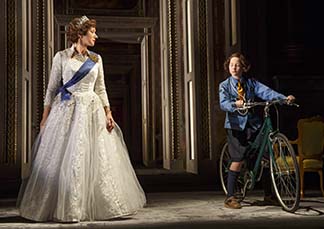
Morgan has imagined, based on what was going on at the times, what the PMs might have said to the Queen. Except there were no notes. No Nixon-style or NSA recorders.
There‘s a bit of her as a child and young woman, just a hint of the personage who, through the years, beginning with Churchill, received PMs once a week for 20-minute meetings to hear their reports of what was going on. Not too much detail given or expected. Advice nodded at and dismissed. But, something of character comes through.
I liked the portraits of Laborite Wilson and Tory John Major. Both were not of the upper class; both went to state schools. Major seems a bit insecure in his place, but Wilson is robust and assertive, and the Queen appreciates him. Though it really doesn‘t matter.
For people in the audience not familiar with British political history, the play bill includes a scorecard.
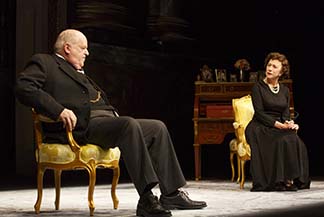
Morgan goes through Churchill, (PM when Elizabeth became Queen in 1952); Anthony Eden (Suez crisis, ie U.S.-supported Israeli-British-French invasion of Egypt/Suez Canal); Harold Wilson (reforms in education, health, housing gender equality, dealing with disabled and child poverty – clearly the best of the lot), Margaret Thatcher (dreadful, except for the rich).
Then John Major (he seems insecure in his post), Laborite Tony Blair (pet poodle of George Bush supporting U.S. invasions of Afghanistan and Iraq); his party successor Gordon Brown (disappointment to self and others), David Cameron, (the current Tory PM).
There‘s a lot about class, and it‘s the most interesting part. John Major tells the Queen, “When I walk in the room, heads fail to turn.” He went to a state school; the Queen says pointedly that she never heard of it.
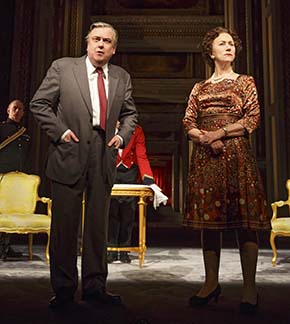
We see how the Queen in the end is unimportant for those who run government. She asks Churchill after WWII, when will there be an end to rationing. He tells her the sovereign listens and supports. The Queen: “Suppose I don‘t agree.” He: “The sovereign always agrees.”
Doesn‘t she know that? Doesn’t the country? Or is she na¯ve to ask the question?
Harold Wilson expresses concern about unemployment. When he dunks a cookie in his tea, she looks askance. So what does that mean? Better someone who doesn‘t care about workers as long as he (or she) has a pinky finger stuck out from the tea cup?
Wilson says, “The empire is gone now. There‘s a revolution taking place. The ruling class is sleepwalking through it.” However, though the empire is gone, the ruling class keeps its grip.
There‘s a bit of a contretemps with Margaret Thatcher after a paper reports that the Queen called her Uncaring, confrontational and socially divisive. That she lacks compassion and that her government‘s policies have done irretrievable damage to the country’s social fabric.
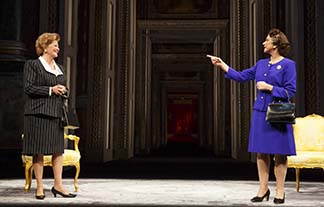
That reflects her anti-union position, dramatically the destruction of the miners‘ union. And Thatcher notes, “It seems the Palace took offense to my stance regarding sanctions against South Africa.” Morgan reminds us that the racist Thatcher objected to supporting opposition to the apartheid South African government.
We also see challenges to the royal system. Some Brits think that they can‘t afford the monarchy‘s luxury, that the royals should pay income taxes.
But Elizabeth says, “If we pay income tax, that makes us like everybody else. We‘re not like everybody else. That‘s the point of us!” I kept wondering why the Brits are so far behind the people who made the French Revolution. She says, It‘s His will that we are who we are.”
John Major says, “If that‘s your opinion.”
She says, “That’s my belief!” She points out that she was consecrated in God‘s house, in the British Episcopal Church.
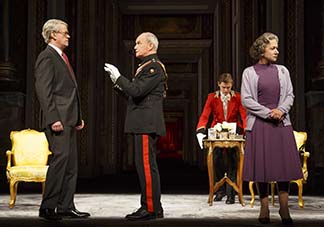
And he says, “Then it‘s worth bearing in mind that Britain is now one of the most secular societies in Europe, so that belief might not be universally shared.”
Major apparently doesn’t go along with the strictures of upper class rule and church. Even the Equerry has to advise him on the right way to behave with the Queen. It increases my admiration of Major.
Morgan’s Queen has a sharp, incisive take on Tony Blair. In her conversation with him about the planned Iraq invasion, she inquires, “Is it legal?” Blair replies, “ Ma‘am, Saddam Hussein has been given ‘a final opportunity to disarm’ by UN Security Council Resolution 1441, which he has failed to do.” Elizabeth: “And you believe that is sufficient authority to go to war? “ Blair says, “I do. And more importantly, so do the Americans. They have made their decision, and as you know, with our oldest ally, it‘s our job to support.”
He predicts that “liberated Iraqi‘s will cheer our soldiers in the streets after a short, sharp and easy campaign.” She wonders whether a diplomatic solution could be reached. The resolution calls on Iraq to destroy its weapons of mass destruction. Iraq said it didn’t have any and invited U.N. arms inspectors into the country. The Americans refused, calling it a ploy, and demanded support for an invasion. It was later discovered that Iraq’s weapons of mass destruction did not exist.
Talking to Blair’s successor, Gordon Brown, she compares that misadventure to the Brits‘ disastrous invasion of Suez in 1956, and remarks, “I suppose that’s what happens if you stick round long enough. The same people, the same ideas come round again and again. Wearing a different colored tie.”
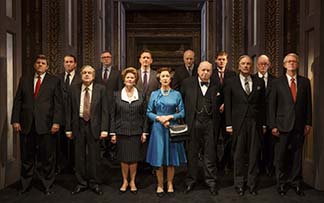
When we see the MPs flanking her, we wonder why Britain couldn’t have done better. Clue: class, status, interests.
Morgan suggests that Elizabeth liked Wilson the best. Flashback to Balmoral Palace in summer. She asks Wilson about his vacation. He spends it in a pre-fabricated bungalow. He gardens, walks, takes boats to nearby islands.
She says, “I love it on the water.” She can kick off her shoes and walk barefoot. “On the water?” he inquires. “On the Royal Yacht, Britannia,” she replies.
When Wilson attacks Tory Ted Heath as a snob, she says, “What makes you think I‘m not?”
He says, “You may be the richest woman in the world, but privately, I know you’re worrying about the cost of the central heating, and reminding yourself to go back into the room to switch the lights off. In fact, I’d even go as far to say there’s a good union woman in there somewhere.”
But there isn‘t. To the manor born doesn‘t change. Maybe Morgan‘s subtle message is that Britain needs a republic.
“The Audience.” Written by Peter Morgan; directed by Stephen Daldry. Schoenfeld Theatre, 236 West 45th Street, New York City. 212-239-6200. Opened March 8, 2015; tickets on sale through June. 3/27/15.

